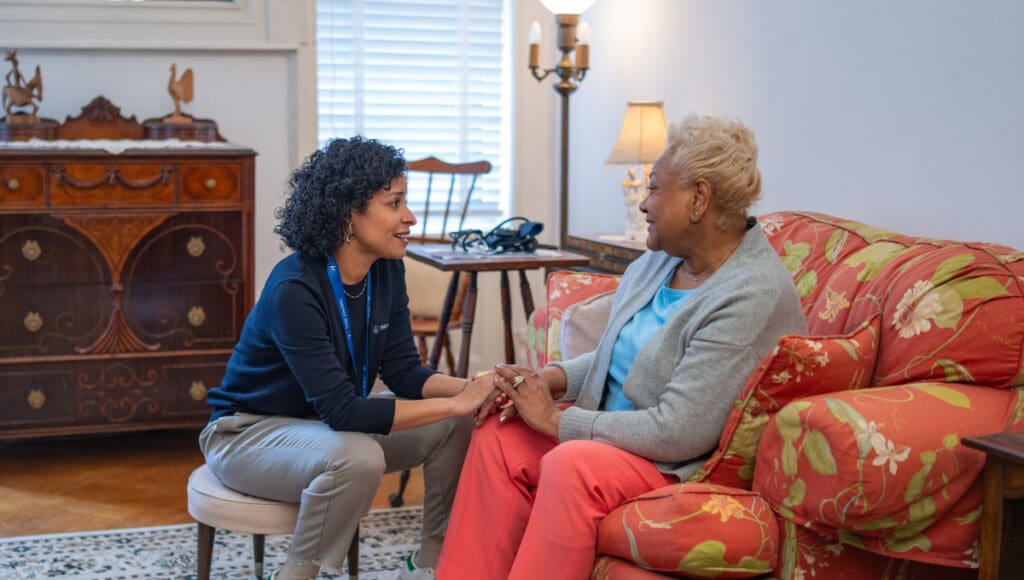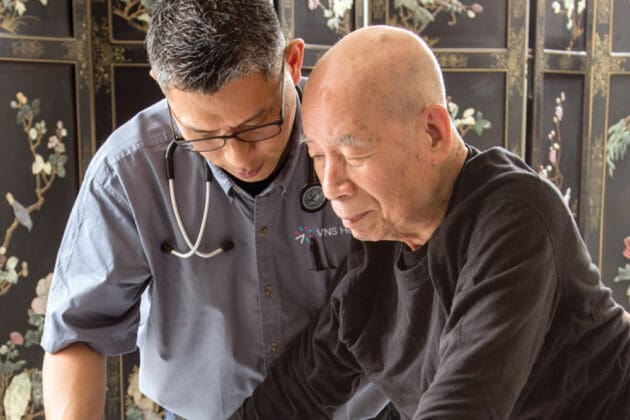
As we transition into fall, we’re all ready to welcome cooler weather, the holidays and cozy activities. However one thing we don’t want this autumn is…well, a physical Fall!
Falls are a leading cause of injury-related death and hospitalization for older adults in NYC, and
nationwide result in millions being treated in emergency facilities. This week is National Falls Prevention Week, an important time to remind everyone to stay as safe as possible and prevent falls before they happen, especially given that most falls occur in-home.
As a licensed senior physical therapist with VNS Health, my colleagues and I work to keep our patients safe from falls in their homes. We educate them and their family caregivers so they are aware of risk factors and consequences of serious falls, and we work to help them build strength and regain balance that can decline with age or after hospitalization. Sometimes people believe that falls are an inevitable or natural part of aging—I can assure you, that does not have to be true. As a matter of fact, falls can be significantly reduced–even prevented–by implementing some practical lifestyle adjustments.
With that in mind, here are some tried and true tips for caretakers and homebound seniors to prevent falls in or around the home.
Clear Your Path
Cluttered homes can be severe safety hazards and increase chances of tripping or falling. Evaluate each room in the home and consider rearranging furniture or putting certain items into storage in order to create as open of a space as possible. Take note of any objects that can increase risk of tripping such as shoes, books, laundry baskets, pet toys or anything that can roll. Electrical wires should also be moved out of walkways or taped down. Do not hide any wires under rugs, as this can be a fire hazard!
Slippery When Wet
Be aware of any liquid spills, including water transfers from sinks, showers, swimming pools, rain–even condensation from air conditioners–that can increase chances of slipping. Bathrooms are high-risk areas for falling, so make sure to have anti-slip bathmats in your shower or bathtub. Railings or grab bars in the bathroom are also helpful to have in order to improve steadiness, catch any slips before they become falls or help get you back on your feet after a fall. Rugs should also be laid out in the bathroom, especially outside of the shower, to avoid any wet and slippery floors.
Keep Light on Your Feet
Make sure to keep your home well lit, especially as autumn approaches and the sun begins to set earlier in the day. Take advantage of daylight, open your window blinds and “let the sunshine in,” but as also make sure to keep entryways and staircases well lit. Plug-in nightlights are helpful to have along stairways and in shadowed corners as well as right below light switches that might not be easy to see on the wall. Keep tableside lamps in frequently used locations such as the bedside and living room.
Find your ‘Sole’mate
Putting the correct shoes on your feet can help you stay on your feet! Ill-fitting shoes can increase
instability or chances of falling. Make sure to wear proper footwear with anti-slip properties, closed
backs and rubber soles. Also, in perhaps one of the first falls prevention lessons we are taught, always make sure your shoelaces are tied!
Let’s Get Physical!
Increased time spent at home due to social distancing is likely to reduce body movement, so it is vital to maintain strength and agility through regular activity. Healthy seniors and people of all ages should participate in an exercise program at least twice a week at home, with doctor’s approval. Your doctor may even recommend you work with a physical therapist if you’re living with a condition that can interfere with your movement or coordination. Simple stretches or yoga poses can also be effective in staying active and improving balance. Pairing up with a friend can make exercise fun and safe as well.
Getting in Gear
Canes, walkers, or other assistive devices can make a world of difference in terms of stability. Walking equipment should always be within arm’s reach (or on each level of the home if there are multiple stories). Equipment should also be maintained regularly, and rubber tips on canes and walkers should be kept intact. Worn-out tips are unreliable and can increase chances of falling, so be sure to visit your local drugstore or local surgical supply store to purchase new rubber tips if needed.
Glasses with a proper prescription are also essential, especially as one gets older. According to the
National Institute on Aging, as one ages, less light reaches the retina which can make contrasting edges, obstacles, potential safety hazards and obstacles more difficult to see. Poor depth perception can also lead to problems navigating uneven or slippery surfaces. Seniors should visit a doctor for a vision assessment every year and pursue treatments that will correct any problems that arise.
Know the Health Risks
Seniors and caretakers should be well-informed on certain health conditions that increase the risk of falls. For example, diabetes can cause joint pain, foot sensitivity, dizziness and vision problems. COPD, CHF, low blood pressure and other circulatory diseases can also cause dizziness and affect balance. Balance and mobility may be impacted by bone and joint conditions, such as osteoporosis and arthritis, and eye diseases such as glaucoma and cataracts interfere with vision.
Medications that depress the central nervous system increase the risk of falling, as do certain
medications, such as pain relievers, heart medications, antidepressants, seizure medications, over-the counter sleep aids, allergy medications and some cold and cough remedies. Optimal awareness and regular check-ins with your physician can help manage symptoms, address side effects and reduce risk.
Stay Connected
While many homebound seniors have assistance at home, their loved ones may not be able to visit them frequently. Mobile devices are extremely helpful to have on hand, whether for simple text messaging, voice or video calls, or even for use of your phone’s built-in flashlight to see more clearly in the dark. Be sure to have caretakers on speed dial in case of a severe fall or other health-related emergency, or identify a neighbor who can be trusted in case of immediate need. If your loved one is at risk of damaging falls or health conditions, regular check-ins can be very useful, especially in a time of such isolation, and may even help save a life! Home care providers like VNS Health can also provide information about setting up a subscription with services like Life Alert for elderly loved ones who live alone.
Read the full article here.
Visit our Falls Prevention page to learn more about our program.


